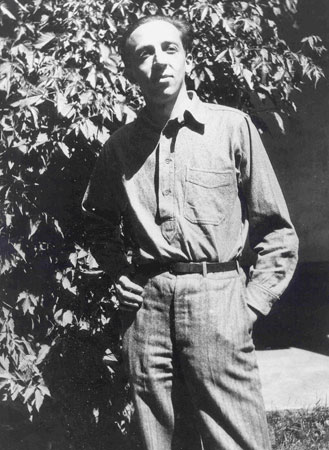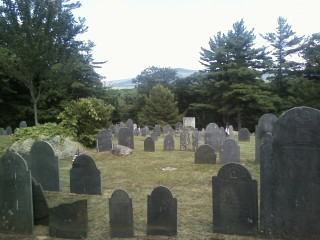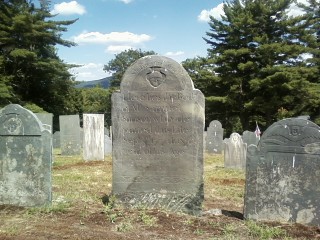“With critics you sometimes get more than you deserve, you sometimes get less than you deserve. You never ever get what you deserve.”
Alan Ayckbourn, The Crafty Art of Playmaking
Archives for July 2012
TT: When this you see
I’ve been at the MacDowell Colony for three and a half weeks, long enough to know that I want to come back as soon as I can. That said, you can only put in so many ten-hour days of nonstop writing before you get to feeling a little bit stir-crazy, so I flew the coop last Friday night and went to a Monadnock Music concert in Peterborough.
 One of my fellow colonists had a piece on the program, but for me the real draw was the original thirteen-instrument version of Aaron Copland’s Appalachian Spring, a masterpiece that I love with all my heart. Appalachian Spring has a special meaning for me: it’s the first piece of modern classical music to which I ever listened closely. That was way back in 1968, but I can recall with perfect clarity how overwhelmed I was by the sound of the transparent, luminous arpeggios with which the piece begins. I still am.
One of my fellow colonists had a piece on the program, but for me the real draw was the original thirteen-instrument version of Aaron Copland’s Appalachian Spring, a masterpiece that I love with all my heart. Appalachian Spring has a special meaning for me: it’s the first piece of modern classical music to which I ever listened closely. That was way back in 1968, but I can recall with perfect clarity how overwhelmed I was by the sound of the transparent, luminous arpeggios with which the piece begins. I still am.
Amazingly enough, though, I’d forgotten that Copland wrote Appalachian Spring at the MacDowell Colony, and somehow that fact heightened the intensity with which I received it on Friday. Though I know every bar of the piece, it sounded as new as the smell of fresh-cut grass.
I’ve been buttoned up tightly ever since my mother died two months ago. I thought that writing about her death would help, but all it did was put my emotions in a neatly wrapped box, and it wasn’t until after I got to MacDowell that I peered inside. One of my fellow colonists gave a reading of a piece about a personal experience that had a near-exact parallel in my own life. She and I had talked about the experience a few days earlier, but I had no idea that she was planning to write about it until she started reading. Then she caught my eye, and we both burst into tears.
Not at all surprisingly, much the same thing happened to me as I listened to Appalachian Spring last Friday. I don’t think it would have happened, however, if I’d been listening to an explicitly emotional piece. No, it was the coolly detached radiance of Copland’s harmonies that drew out my own feelings. He didn’t presume to speak for me, or anyone else: all he did was fill the air with light, and my soul responded.
After the concert I saw a young poet from MacDowell standing in a corner, scribbling urgently in a notebook. When she finished writing, I walked over to her and said, as casually as I could, “You’d never heard it before, had you?”
She looked at me, shook her head, and said, “It was so wonderful! I didn’t know that music could do that!”
Three days later I received a report from Martha’s Vineyard about the first public reading of the revised version of Satchmo at the Waldorf that will open at Shakespeare & Company a few weeks from now. That same night another new friend of mine read a piece that I found both powerfully moving and deeply disturbing. When she was done, I said to myself, I’ve got to get out of here for a little while.
It wasn’t that I wanted to end my stay–far from it–but I knew that I needed to put some space between myself and the sparks thrown off by thirty-two hard-working artists who are simultaneously trying to make everything more beautiful. So I borrowed a car yesterday morning, rolled down the windows, and drove all over Peterborough and the surrounding countryside, blissfully thinking about nothing at all.
 A couple of hours later I made a random turn onto a tree-lined road, and all at once I knew where I was. On my left was a fenced-off hill, and just beyond the fence were tombstones. I had come to the half-forgotten cemetery that inspired Thornton Wilder to write the graveyard scene of Our Town.
A couple of hours later I made a random turn onto a tree-lined road, and all at once I knew where I was. On my left was a fenced-off hill, and just beyond the fence were tombstones. I had come to the half-forgotten cemetery that inspired Thornton Wilder to write the graveyard scene of Our Town.
It was four years ago that Mrs. T and I came to this place the morning after seeing James Whitmore play the Stage Manager in a Peterborough Players revival of Our Town. I took it for granted that we would never return. Some things should only be done once. But as I looked at the gate, I felt an irresistible urge to climb the hill again, partly because I missed my wife so much and partly because…well, because it seemed appropriate.
I needed no reminder that Thornton Wilder wrote Our Town at the MacDowell Colony, since it was written in the same studio where Paul Moravec worked on The Letter, our first opera. I knew, too, that it was Copland who composed the score for the film version of Our Town, and who wanted very much to turn the play into an opera. Now that I, too, was spending my days in the same place where Copland and Wilder once worked, I thought it right to pay a second visit to the plot of land that had meant so much to both of them.
 Once more I climbed the steep hill, but this time I knew what I was looking for. No sooner did I stumble across the tombstone of Samuel Stinson four years ago than I knew that Thornton Wilder had almost certainly stood where I was standing, for one of the characters in Our Town is a desperately unhappy church organist named Simon Stimson. It took me a few minutes to find the spot, and when I did, I stood in silence for a long time, gazing at the stone.
Once more I climbed the steep hill, but this time I knew what I was looking for. No sooner did I stumble across the tombstone of Samuel Stinson four years ago than I knew that Thornton Wilder had almost certainly stood where I was standing, for one of the characters in Our Town is a desperately unhappy church organist named Simon Stimson. It took me a few minutes to find the spot, and when I did, I stood in silence for a long time, gazing at the stone.
I sat on the ground to take a picture of Samuel Stinson’s grave. I haven’t been in a cemetery since my mother died, I thought. But this time I didn’t cry. Instead I sat in the afternoon sunshine and remembered the piercing question that Emily Webb asks at the end of Our Town: “Do any human beings ever realize life while they live it?–every, every minute?”
To which the Stage Manager replies, gently but inexorably, “The saints and poets, maybe–they do some.”
I vowed to do my best to be present for each and every moment of my life, knowing even as the words formed in my head that it is in the nature of such vows to be broken. Then I walked down the hill to my car and drove back to the MacDowell Colony, there to rejoin my friends and resume my work.
TT: So you want to see a show?
Here’s my list of recommended Broadway, off-Broadway, and out-of-town shows, updated weekly. In all cases, I gave these shows favorable reviews (if sometimes qualifiedly so) in The Wall Street Journal when they opened. For more information, click on the title.
BROADWAY:
• Anything Goes (musical, G/PG-13, mildly adult subject matter that will be unintelligible to children, closes Aug. 5, reviewed here)
• The Best Man (drama, PG-13, closes Sept. 9, most performances sold out last week, reviewed here)
• Evita (musical, PG-13, most performances sold out last week, reviewed here)
• Once (musical, G/PG-13, all performances sold out last week, reviewed here)
OFF BROADWAY:
• Avenue Q (musical, R, adult subject matter and one show-stopping scene of puppet-on-puppet sex, reviewed here)
• The Fantasticks (musical, G, suitable for children capable of enjoying a love story, reviewed here)
• Tribes (drama, PG-13, closes Sept. 2, reviewed here)
IN CHICAGO:
• Freud’s Last Session (drama, PG-13, restaging of off-Broadway production, closes Sept. 2, reviewed here)
• A Little Night Music (musical, PG-13, closes Aug. 12, reviewed here)
CLOSING SOON ON BROADWAY:
• Anything Goes (musical, G/PG-13, mildly adult subject matter that will be unintelligible to children, closes Aug. 5, reviewed here)
CLOSING SATURDAY IN PITTSFIELD, MASS.:
• Fiddler on the Roof (musical, G, reviewed here)
CLOSING SUNDAY IN CHICAGO:
• Floyd Collins (musical, G, very problematic for children, reviewed here)
CLOSING SUNDAY IN PASADENA, CALIF.:
• Jitney (drama, PG-13, transfer of South Coast Repertory revival, original run reviewed here)
TT: Almanac
“Popular legend has it that actors are vain creatures. Some are, some aren’t. Authors, though, poor lonely people, are nine tenths vanity; they live their whole lives believing without question all the good things that have ever been written about them.”
Alan Ayckbourn, The Crafty Art of Playmaking
TT: Snapshot
Alan Ayckbourn is interviewed by Michael Riedel and Susan Haskins on Theatre Talk in 2009:
(This is the latest in a series of arts-related videos that appear in this space each Monday and Wednesday.)
TT: Almanac
“All writers overwrite (including Shakespeare).”
Alan Ayckbourn, The Crafty Art of Playmaking
TT: Lookback
 From 2003:
From 2003:
I told a friend of mine at lunch the other day that I thought the day would come when the producers of smart movies aimed at older viewers (i.e., anyone over 21) would bypass theatrical release altogether and market such films in more or less the same way novels are sold in bookstores. If that happens, I’ll be sorry to spend less time in theaters. The enveloping experience of watching a good film in a big, dark room–and in the company of a rapt audience–is unique and irreplaceable. Alas, it’s already been replaced, at least for most of us who love classic films. How many of the great movies of the past have you seen in a theater? Not many, I suspect….
Read the whole thing here.
TT: Almanac
“The best comedy springs from the utterly serious.”
Alan Ayckbourn, The Crafty Art of Playmaking
